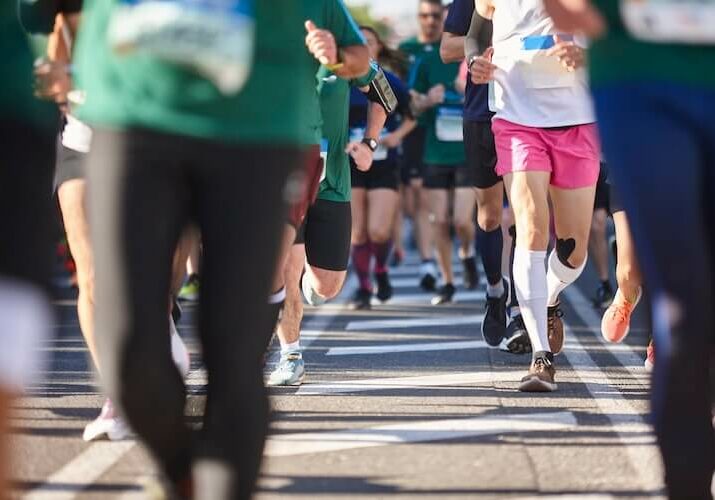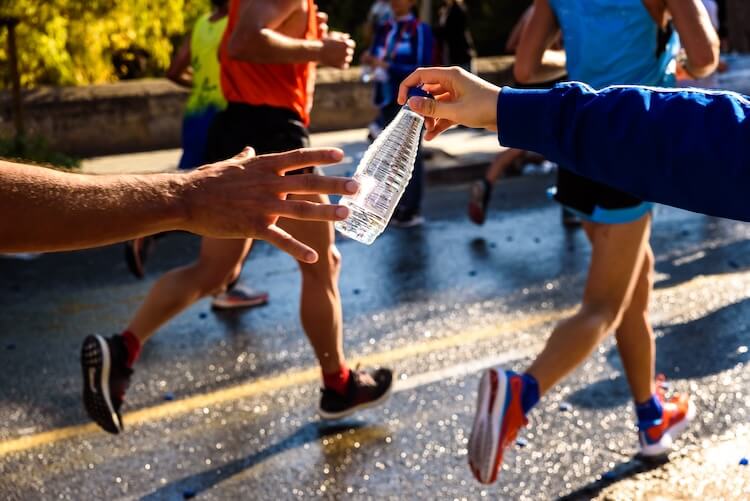The Importance of Post Marathon Recovery

Completing a marathon is a major accomplishment, but the journey doesn’t end when you cross the finish line. In fact, post marathon recovery is just as crucial as the training leading up to race day.
Without proper recovery, marathon runners can face unnecessary pain, prolonged muscle soreness, or even injuries that could set them back for months. To ensure a smooth recovery, it’s important to follow a structured marathon recovery plan that addresses hydration, nutrition, and rest.
Many runners, especially those finishing their first marathon, often underestimate the toll 26.2 miles can take on their body.
The physical and mental exertion required to complete a marathon is significant, which is why post marathon recovery must be treated as an integral part of the marathon journey.
What Happens to the Body After a Marathon?
After the marathon, your body enters recovery mode. During the race, muscles undergo strain, and tiny tears occur in the muscle fibers.
This leads to what is commonly referred to as delayed onset muscle soreness (DOMS).
This soreness typically peaks 24 to 72 hours post marathon and is caused by muscle damage and inflammation, as well as the build-up of lactic acid.
In addition, blood vessels expand during the race to increase blood flow, but post marathon, this can lead to muscle tension and soreness.
This is why ice baths and compression gear are often recommended to help alleviate inflammation and improve circulation.
It’s important to note that most runners will also experience chronic pain in certain muscle groups, particularly if they haven’t trained adequately or are dealing with overuse injuries.
The Recovery Timeline: How Long Does it Take to Recover from a Marathon?
The time it takes to recover from a marathon depends on several factors, including how well you trained, your fitness level, and whether you’ve experienced any injuries. However, it generally takes about a week to feel somewhat normal, with two weeks being a more realistic timeline for complete recovery.
The first few days post marathon are crucial. During this time, focus on rehydration, replenishing lost nutrients, and giving your body the rest it needs to start repairing itself.
In the first week, activities such as light exercise or active recovery sessions like swimming-based recovery can aid in reducing muscle stiffness without putting too much strain on your tired muscles.
For elite athletes, recovery may happen more quickly due to their advanced training and recovery strategies.
However, for many runners, it’s essential to listen to your body and avoid jumping back into training too soon.

Key Components of a Marathon Recovery Plan

Your marathon recovery plan should be personalized to meet your body’s specific needs. Below are some key components to consider:
1. Rehydrate and Refuel
Hydration is a vital part of post marathon recovery. During the race, you lose fluids and electrolytes through sweat, which can leave you dehydrated. Water and sports drinks should be your go-to in the first few hours post marathon to help replenish lost electrolytes and support recovery.
2. Prioritize Rest and Sleep
Adequate rest is essential for your muscles to recover fully. Getting deep sleep is crucial for the recovery process, as it allows your body to repair damaged tissues and produce growth hormones that contribute to muscle growth and healing. Aim for extra sleep in the days following the race to help your body bounce back faster.
3. Gentle Movement and Active Recovery
Incorporating active recovery activities like walking, light exercise, or foam rolling can help reduce muscle soreness and relieve muscle tension. Additionally, sports massage can help loosen tight muscles and aid recovery by increasing blood flow to the affected areas.
It’s also important to do stretches, particularly focusing on areas that may have tightened during the race, such as your calves, hamstrings, and quadriceps.
Relieving Muscle Soreness and Tension
A good sports massage post marathon can do wonders for tired muscles. It helps to reduce muscle soreness by breaking up any lactic acid build-up and promoting blood flow. For those experiencing severe muscle stiffness, foam rolling or using a massage gun can help relieve tension and promote healing.
Another effective method for reducing inflammation and relieving muscle tension is through ice baths or using cold therapy on affected areas. This reduces swelling and promotes faster recovery, especially for sore muscles that are particularly tight.
Nutrition for Optimal Post Marathon Recovery
After completing a marathon, your body is in desperate need of replenishment. While hydration is essential, nutrition plays an equally vital role in the post marathon recovery process. Eating nutrient-dense foods, including complex carbohydrates, lean proteins, and healthy fats, helps fuel muscle recovery and restore the body’s depleted energy stores.
Carbohydrates help restore glycogen levels that were significantly diminished during the marathon, while proteins support muscle growth and repair the muscle damage sustained throughout the race. Including anti-inflammatory foods like fatty fish, nuts, and leafy greens can help reduce muscle soreness and inflammation.
1. Fueling With Sports Drinks and Nutrient-Rich Foods
In the few hours following the race, consuming sports drinks with electrolytes is an effective way to kickstart hydration. In addition to water and sports drinks, it’s essential to consume foods rich in potassium, magnesium, and sodium to prevent muscle cramps and support blood flow.
Bananas, spinach, and sweet potatoes are great choices for replenishing these vital nutrients. The combination of adequate sleep, hydration, and proper nutrition will have a significant impact on your recovery time and help you return to your normal routine quicker.
Active Recovery and Gentle Exercise: Promoting Blood Flow
Engaging in active recovery is one of the most effective ways to reduce muscle soreness and facilitate the recovery process. While you may feel the urge to completely rest, gentle activities such as walking, swimming, or cycling promote blood flow without overstraining the body. Activities like these also aid in flushing out lactic acid from the muscles, which can accumulate after long periods of exertion, like during a marathon.
During this time, it’s crucial to listen to your body. While elite athletes may jump back into rigorous training within about a week, for most marathon runners, it’s best to focus on light exercise for the first week and gradually build up your intensity over the next few weeks.
For those who want to get back into their fitness routine faster, incorporating swimming-based recovery sessions can be particularly beneficial. Swimming supports cellular recovery by providing resistance without the impact that running places on the joints.
Managing Muscle Tension and Preventing Overuse Injuries
A common issue for marathon runners is muscle tension and overuse injuries that can arise post marathon. To relieve muscle tension, tools like foam rollers and compression gear are highly recommended. Foam rolling, in particular, targets the fascia (the connective tissue surrounding muscles), promoting flexibility and reducing muscle stiffness.
Compression socks or sleeves can also improve circulation and further reduce inflammation in sore muscles. These methods are especially useful during the first week of post marathon recovery, helping you avoid overuse injuries and ensuring that you recover fully before returning to high-impact exercises.
The Role of Sleep in Marathon Recovery
Getting adequate sleep post marathon is crucial. While sleep is often overlooked, it plays a major role in the body’s ability to heal and recover. During deep sleep, the body releases growth hormones that promote tissue repair and muscle growth. This is especially important for endurance athletes, whose muscles and joints take on significant stress.
It’s also during sleep that the immune system becomes more active, helping to repair any muscle damage caused by the marathon. Marathon runners should aim for extra sleep in the days following the race to optimize recovery.
Dealing With Post Marathon Soreness
For most runners, sore muscles and fatigue will be prevalent after crossing the finish line. The soreness is mainly due to the muscle damage caused by the repetitive motion of running long distances. To help alleviate this, many runners turn to sports massage, which can help relieve tension and promote blood flow.
Some athletes also use ice baths and compression gear to help reduce swelling and minimize inflammation. These methods can help you feel less stiff and allow your body to bounce back more quickly.
It’s important to recognize that every runner’s body responds differently to the intensity of a marathon, so what works for one person may not work for another. Your recovery strategy should include personalized approaches that consider your fitness level and any overuse injuries.
Treating Overuse Injuries Post Marathon
One of the common risks during post marathon recovery is developing overuse injuries. These can occur if runners don’t give their bodies enough time to heal after the race, or if they push themselves back into training too soon. The most common injuries include tendinitis, stress fractures, and shin splints.
Physical therapists and running coaches recommend using a gradual approach to returning to running. Strength training is also a crucial part of avoiding overuse injuries. By strengthening the muscles surrounding key joints, you’re better equipped to handle the stress that long-distance running places on the body.
Incorporating Strength Training Into Recovery
While it may sound counterintuitive to focus on strength training during your marathon recovery, it’s actually a key element in preventing injury. Light strength training can enhance muscle growth and improve joint stability. Strengthening your core, glutes, and hamstrings will help you avoid the muscle tension and stiffness that marathon runners often experience.
Focus on light exercise that doesn’t stress the legs too much, such as bodyweight squats, lunges, and planks. These exercises will help you recover fully while laying the groundwork for future training.
The Role of Physical Therapists in Marathon Recovery
For many runners, working with a physical therapist can significantly speed up the recovery process. Physical therapists offer personalized care that addresses any specific muscle damage or overuse injuries sustained during the marathon. They may also provide hands-on treatments, such as sports massage, that help promote blood flow and relieve muscle tension.
Physical therapists can also recommend stretches and exercises to help runners recover safely while minimizing the risk of future injuries.
Returning to Your Normal Routine
After a marathon, it’s crucial to ease back into your normal routine gradually. Many marathon runners find it beneficial to integrate light exercise, such as walking or swimming, during the first week of post marathon recovery. This helps maintain blood flow to the muscles without placing too much stress on the body.
You should also prioritize adequate sleep and pain management techniques, such as foam rolling or compression gear, to ensure a complete recovery. As you progress, slowly reintroduce more intense training, but avoid rushing back to heavy running sessions too soon.
Working with a physical therapist or running coach can help you tailor a marathon recovery plan suited to your individual needs, ensuring you reduce muscle soreness and prevent injury. With the right approach, you’ll be back on track to your next race, stronger and fully recovered.
By following a well-structured post marathon recovery plan, you can avoid overuse injuries, build strength, and prepare your body for future challenges.

